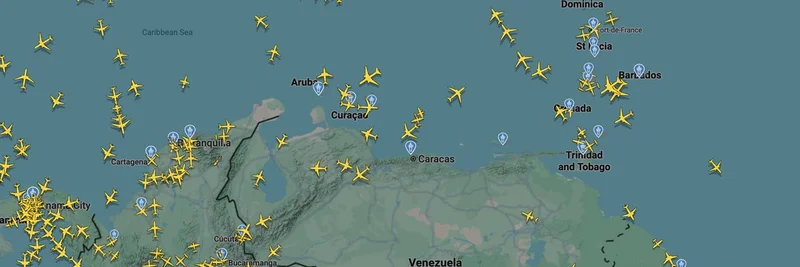If you're tuned into the wild world of crypto, you know that geopolitical drama can send shockwaves through the markets faster than a pump-and-dump scheme. Recently, a tweet from crypto commentator MartyParty (@martypartymusic) has everyone talking. He posted a map showing commercial flights dodging Venezuelan airspace like it's a no-go zone, and simply asked: "What's the trade?" This sparked a thread full of speculation, tying into broader news about Venezuela's economy and its growing embrace of blockchain tech.
What's Going On with Venezuelan Air Traffic?
The image MartyParty shared paints a clear picture: dozens of planes rerouting around Venezuela, clustering over neighboring countries like Colombia, Guyana, and the Caribbean islands. This isn't your everyday flight path—it's a sign of caution. Airlines often avoid airspace in regions with political instability or potential conflicts to ensure passenger safety. Venezuela has been in the headlines for years due to economic turmoil, hyperinflation, and political tensions under the Maduro regime. But why now?
Digging into the thread, replies point to fresh rumors amplified by a Miami Herald article claiming the US was "poised to strike military targets in Venezuela" as an escalation against Maduro. This kind of news can make markets jittery, especially in commodities like oil—Venezuela's a major producer—and by extension, crypto, which often reacts to global risk.
One savvy reply from @BalistrariaFund highlighted a post by former US Senator Marco Rubio, who called out the Herald's story as fake news based on tricked sources. Rubio's tweet essentially debunked the imminent threat narrative.
As the reply notes, "Rubio wouldn't have made this post if something was imminent. The play is to stay calm and buy any dip on rumors." Classic crypto wisdom—fear, uncertainty, and doubt (FUD) often create buying opportunities when the dust settles.
Tying It to Crypto and Meme Tokens
Venezuela isn't new to crypto. With the bolívar in freefall, many Venezuelans have turned to Bitcoin and stablecoins for stability. Just today, reports emerged that Conexus, Venezuela's leading payments provider, plans to integrate Bitcoin and stablecoins like USDT into the national banking system by December Venezuela to Integrate Bitcoin and Stablecoins into Banking. This move could boost crypto adoption in the region, making it a hotspot for blockchain innovation amid economic chaos.
But how does air traffic tie into meme tokens? Geopolitical FUD like this can trigger volatility spikes. Meme coins, those fun, community-driven tokens often inspired by internet culture or current events, thrive on hype and speculation. Think about it: rumors of US involvement could pump tokens tied to political themes, like Trump-related memes (given his past tough stance on Venezuela) or even satirical coins poking fun at Maduro.
For instance, projects like World Liberty Financial (WLFI), a dollar-pegged stablecoin initiative with ties to US politics, might see interest if stability becomes a bigger talking point Venezuela's broken economy attempt to rebuild. On the flip side, if markets dip on the news, it's prime time for buying established memes like Dogecoin or emerging ones that capitalize on the drama.
Other replies in the thread joked about "Venezuelan airline stocks" or pointed to oil and gold—key assets that influence crypto prices. A dip in oil due to perceived risks could drag down BTC, creating entry points for traders. And let's not forget Venezuela's own Petro token, a government-backed crypto that's been controversial but highlights the country's blockchain experiments Petro on Wikipedia.
Why This Matters for Blockchain Practitioners
As someone who's covered crypto from the front lines, I can tell you events like this are golden for learning. They show how real-world geopolitics intersects with decentralized finance (DeFi). If you're building or trading in the space, keep an eye on tools like flight trackers (e.g., Flightradar24) for early signals of tension—these can precede market moves.
In the meme token world, speed is everything. Communities might spin up a "Venezuela Airspace" meme coin overnight, riding the wave of virality. But remember, these are high-risk plays—do your due diligence, and never invest more than you can afford to lose.
The thread also links to a Twitter Space for deeper discussion, so if you're curious, check it out here. MartyParty's take as a macro analyst adds credibility, reminding us that crypto isn't isolated from global events.
Final Thoughts on the Trade
So, what's the trade? Based on the thread, it's about staying level-headed amid rumors. Buy the dip in BTC or stablecoins if FUD hits, or scout for meme tokens that emerge from the buzz. With Venezuela doubling down on crypto integration, this could be the start of more positive news overriding the noise.
Stay informed, trade smart, and keep watching those skies—both literal and metaphorical—in the crypto universe.

